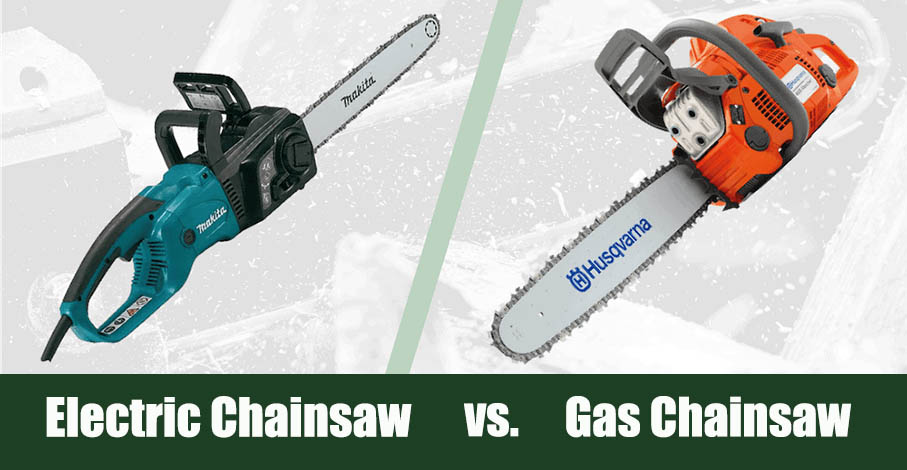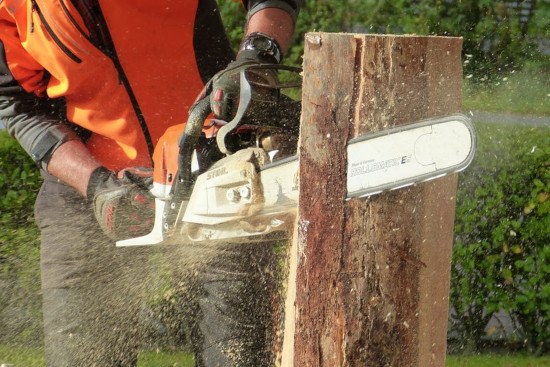Electric vs Gas Chainsaws – Which is Right For Your Needs?
-
Pete Ortiz
- Last updated:

There is no doubt that chainsaws can make quick work of projects that would have taken all day with a hand saw. First patented in early 1900s San Francisco, the first chainsaws were created with the intention of cutting down the area’s massive redwood trees – a near impossibility for hand tools!
Technology for both electric and gas chainsaws has come a long way since then. And if you’re wondering which type of chainsaw is best for you, you’ve come to the right place. In today’s article, we’ll be covering the major differences between gas and electric chainsaws to help you understand what type of jobs each tool excels at.
Gas Chainsaws
The tool of choice for heavy outdoor jobs, gas chainsaws can be seen in use by professionals such as landscapers, arborists, and loggers. While their gas/oil fuel mixture can be a hassle to work with, their excellent cutting power and longer run time make them an attractive option for manual laborers.
Let’s look at what sets them apart from their electric competition:
Common Uses for Gas Chainsaws
Gas-powered saws are used in both home and commercial settings, as well as anywhere in between. Farmers and ranchers swear by them because they combine power and portability.
Powerful enough to cut down large trees or break up fences, they’re the tool of choice for people who need to get medium- to large-sized jobs finished quickly and efficiently. Whether you need to cut down an old tree on your property or do an entire day’s landscaping work, a gas chainsaw will get the job done.
- More power and faster cutting speed than electric chainsaws
- Able to cut large trees and branches
- Gasoline fueling systems give it a long run time
- Available in a wide range of bar lengths
- Creates more noise
- Produces oil and gas fumes
- Often more expensive than electric chainsaws
- Heavier and more fatiguing to carry
Electric Chainsaws
Cleaner and more energy-efficient than gas-powered saws, electric chainsaws often feature a lower maximum cutting power as well. While they may not be as rugged and reliable for heavy cutting or long workdays, they’re a wonderfully convenient option for basic yard work and chores around the house.
The cutting ability of an electric chainsaw can be quite different depending on whether it’s corded, or battery-powered. Those saws that are powered by batteries have the advantage of being extremely portable, but corded saws often boast significantly greater cutting power.
Let’s see how they differ from gas chainsaws:
Common Uses for Electric Chainsaws
The light and compact nature of electric chainsaws make them ideal for small- to medium-sized jobs around your house and backyard. If you are looking to keep your trees in tip-top shape, they’re an excellent tool for the job.
Turn to an electric chainsaw when you need to trim dead branches, cut small logs for backyard fire pits, and otherwise keep your yard looking great. They are light enough to carry around for extended periods without giving in to fatigue of your arms, hands, or back.
Also, they are quieter and don’t put off any of the noxious fumes of gas chainsaws. This makes them more pleasant to use in a quiet neighborhood, easier on your lungs, and better for the environment.
Whether battery-powered or corded, homeowners can expect minimal maintenance with an electric chainsaw. This convenience makes it ideal for anyone who doesn’t have plans to be using their chainsaw more than once a week.
- Great for yardwork
- Lightweight and easy to transport
- No fumes from burning gasoline and oil
- Easier to start
- Requires very little maintenance
- Not great for heavy-duty sawing
- Battery-powered saws only last for about an hour
- Corded saws have limited range (up to 100 feet)
- Not ideal for professional use
Which Type of Chainsaw is Right for You?
All these details bring us to the most important question in deciding which saw is right for you:
What sort of work do you need to do with your chainsaw?
For homeowners and anyone who only occasionally needs to use a chainsaw, electric chainsaws offer many advantages. Cleaner, quieter operating makes them much more enjoyable to use, as does being lightweight and easily portable. Often available at a lower price than gas-powered chainsaws, they’re an easy choice for anyone who doesn’t plan to use their chainsaw in a professional capacity. Requiring little maintenance, they are a convenient tool that’s easy to use.
However, if your chainsaw projects include long hours of work or large trees to cut down, you’ll need the power and operating longevity of a gas-powered chainsaw. Though they require more maintenance and make a lot of noise and fumes during operation, their sheer cutting power is impossible to match with an electric tool.
Conclusion
Thank you for reading our guide to the differences between electric and gas chainsaws. We hope that it’s cleared up any confusion you have over which type of saw is right for you – with electric chainsaws being better for small jobs around the home, and gas chainsaws being the preferred option for larger jobs.
- See Also: 10 Best Electric Chainsaws
Contents




